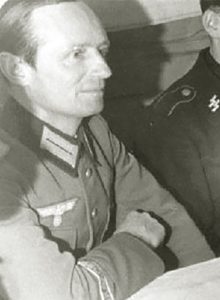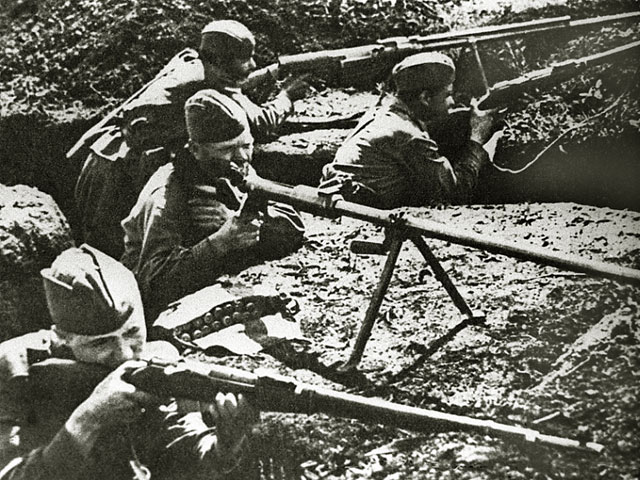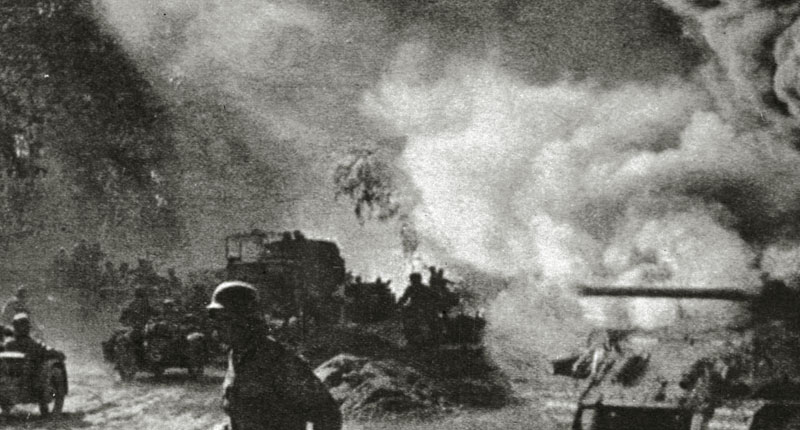Only the enemy, who is dealt with in the war, can give the most unbiased testimonial of one or another army. After the World War II the Germans tried studiously to understand: how did they contrive to lose the war, which seemed to be won splendidly in its very beginning? Who did they face on the 22nd June 1941 after all?
Invisible Red Army men.

Maybe with every detail in his book “Armored fist Wehrmacht” Major General Fridrich von Mellenthin described the behavior of Red Army’s commanding officers and men on the battlefield: “Essentially before every Russian attack there was widely used infiltration of small units and detached groups through the front. Nobody has surpassed the Russians in such kind of fighting so far. No matter how carefully the observation in the front line was arranged, all of a sudden the Russians were found in the very centre of our position. And nobody ever knew how they had managed to pass through.”
Mellenthin remembered especially well an episode of the Kursk Bulge battle when the units of division “Great German” had to fight against Red Army men, who used to “appear from somewhere” all the time, on already captured territory.
The most extraordinary thing for the Germans was the fact that in spite of their full alert and not sleeping a wink all night long, in the morning they could find formed Russian units entrenched deep in the enemy’s rear area fully armed and with ammunition. Such kind of infiltration was usually conducted with greatest art, almost in full silence and without a shot being fired.
Any Russian foothold is dangerous.
Another characteristic feature of Russian behavior is their commitment to make footholds as bases for the future offensive actions. Indeed the footholds at Russian troops’ disposal have always generated serious risk. Someone is deeply wrong who accepts placid the real footholds and postpones their elimination. Russian footholds, no matter how small and innocuous they may seem, are able to become the powerful and dangerous defense islands in a short period of time and then change into inaccessible fortified areas. Any Russian foothold, occupied by a company in the evening, already in the morning is surely held by a regiment at least. And during next night it is turning into a formidable fortress, well supplied with heavy weapons and with all the necessary things which make it almost unapproachable. Any, even artillery fire cannot force the Russians to leave the foothold made at night. Only well-placed attack is able to lead to success. This Russian principle “to have the footholds everywhere” presents very grave danger and it cannot be underestimated.”

In Mellenthin’s judgment, there is only one drastic remedy in the fight against the Russians, which has to be employed in all the cases without fail: if the Russians are making the foothold or rigging the foremost position you have to attack, attack immediately and resolutely. Any lack of resolve in the battles against the Russians has always had the most devastating impact on the Germans. Being late for an hour can result in rebuff of any assault, being late for several hours can result in such rebuff surely, being late for a day can entail great disaster. Even through the Russians have one infantry platoon, the only one tank, they have to be attacked by all means! They have to be attacked, until the Russians dig themselves in, till they can be seen, until they have time for organization of defence, until they possess heavy weapons. In some hours it will be too late. Time-lag leads to defeat, determined and prompt actions succeed.
The Germans emphasized especially the Russians ability to organize the antitank defence, “The Russians like no one knew how to strengthen their ADAs (antitank defensive areas) through minefields and antitank obstacles and also through randomly laid land mines between minefields. The rapidity with which the Russians emplaced mines was striking. In two, three days they had time to emplace more than 30 thousand mines. There were instances, when we had to defuse about 40 thousand mines along the offensive road of the corps during the 24 hours. One more time in this regard, it should be emphasized the cleverest Russian camouflage. During the war the Germans failed to find any minefield, any antitank area until the first tank was blown up by a mine or the first antitank Russian gun fired.”
As for firmness of our soldiers, General Mellenthin was struck most of all by the occasion when thousand surrounded Soviet soldiers fought for four weeks, living on only grass and leaves, “quenching their thirst with infinitesimal amount of water from the deep pit that they dug”
When you are dealing with the Russians, a rapier is much more effective than a club weapon.
“Russian tactics was a strange admixture: along with great skills to infiltrate into enemy emplacement and utmost skill in uses of field fortification there was nearly proverbial inflexibility of Russian attacks (in isolated cases though actions of the tank formations, units and even sub-units were the notable exception). Unreasonable reiteration of attacks on the same part of the line, lack of flexibility for artillery and inappropriate choice of the area to further offensive with a topography point of view indicated the low level of creativity in meeting the challenges and promptly addressing changes in the environment. Only few mid-level commanders displayed independence in solving problems when a situation changed unexpectedly. In many cases the Russians did not take advantages of a successful attack, breakthrough or encirclement just because none of the high command was aware of it. The Russians felt insecure during the flank attack, especially if such an attack was surprise and carried out by tanks. In the course of the World War II such accidents occurred quite often, and we received evidence that skillful use of even small amount of tanks in the attack against the enemy and daring tank raids led to better result than the heavy artillery gun fire and massed air raids. When you are dealing with the Russians, a rapier is much more effective than a club weapon…” Mellenthin wrote.
It has to be said that his resume is typical for German writers. Both Manstein and Guderian and many others of their companions-in-arms made mentions of the tenacity of our troops in the battle, the art to camouflage and fortify the lines, the ability to come “from nowhere” along with the striking inflexibility while offensive and the delayed reaction by command officers to unexpectedness. As for willingness to conduct wittingly unsuccessful attacks in the same part of the line, there are a lot of illustrations of it in the memories of our veterans.

German Generals considered July advancing to Kursk Bulge in 1943 as one of the fatal errors by Hitler. There were not any unexpected attacks there, the Soviet army waited for them beforehand. Therefore they could show their best qualities – endurance and ability to fortify and mine their positions. And German victory was out of the question.